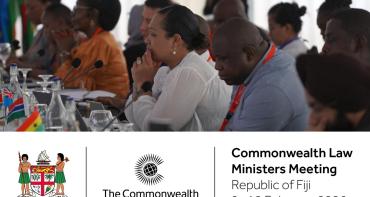Members of the Uganda Sentencing Committee have met with Commonwealth rule of law experts to explore strategies to improve sentencing guidelines, so they cover higher and magistrates’ courts with the overall objective of improving consistency and promoting uniformity in sentencing practices and outcomes.

Members of the Uganda Sentencing Committee have met with Commonwealth rule of law experts to explore strategies to improve sentencing guidelines, so they cover higher and magistrates’ courts with the overall objective of improving consistency and promoting uniformity in sentencing practices and outcomes.
The Committee was set up in 2013 to oversee the implementation of judicial sentencing guidelines and to make reform proposals. The aim of the mission to the UK was to engage with key British stakeholders in the country’s justice sector and explore their sentencing practices.
The visit was co-funded by the judiciary of Uganda and the UK’s Department for International Development (DfID) through ROLE-UK - a DfID-funded initiative that supports international pro bono contributions to the rule of law in developing countries by matching judicial and legal expertise, both private and public sector. It was co-ordinated by EVOLVE-FILA - a UK-registered criminal justice development organisation that provides expert legal assistance and advice to a range of stakeholders in Uganda on a pro bono basis. The initiative aims to improve the rule of law in developing countries by matching judicial and legal expertise, both private and public sector, with demand in developing countries to improve the policies, organisations and practices of legal and judicial systems.
Led by principal judge, Justice Dr Yorokamu Bamwine, the delegation included the country’s Solicitor General, Director- First Parliamentary Counsel, the Deputy Director of public prosecutions, Executive Director Judicial Education Institute, technical advisers and senior judges.
Commonwealth experts introduced the officials to their support package of legislative reform, which helps countries with judicial reform and strengthening criminal justice. Support includes the Office of Civil and Criminal Justice Reform, which was created to facilitate the development of fair and effective national laws.
Uganda will also benefit from the Commonwealth’s Promoting rule of law in the Commonwealth project, which will provide technical support to improve sentencing and other aspects of access to justice by strengthening the legal framework and institutional capacity of the justice, law and order sector (JLOS) through provision of legislative drafting support, training of judicial officers and reform of the case management system.
Thanking the Commonwealth for hosting the meeting, Dr Bamwine underscored Uganda’s commitment to robust access to justice by its citizens.
Deputy Secretary-General Dr Arjoon Suddhoo described the meeting as a strong example of this year’s Commonwealth theme - A Connected Commonwealth.
He said, “I was recently reminded that the whole connectivity process started with having the right regulatory framework and being joined by similar legal systems. I welcome this meeting because it is very much in the Commonwealth spirit of sharing knowhow and exploring, not just what works but also learning from our mistakes by highlighting what does not work.
“And this is certainly not a one-way traffic, because it is about discovering best practices in Uganda and sharing them with our other 52 countries.” The delegation shared experiences of coordination of administration of justice activities across the JLOS sector in Uganda and expressed gratitude for the Commonwealth’s offers of support and encouragement.



